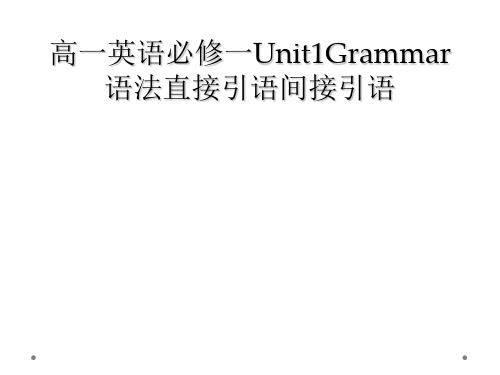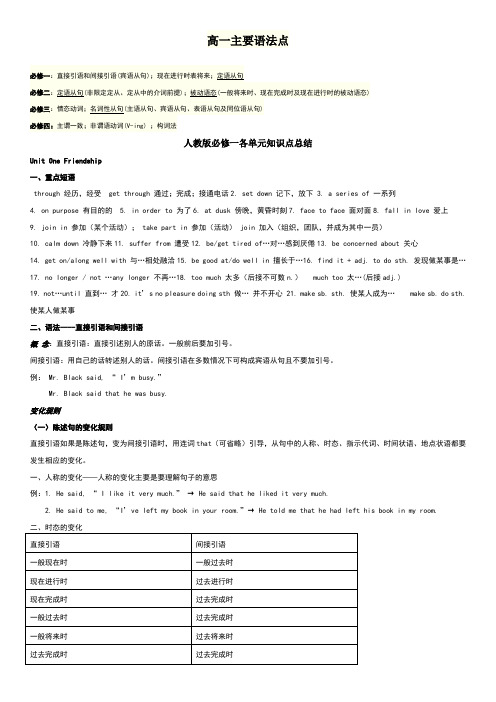最新人教版高中英语必修1 Unit1语法直接间接引语
高一英语Unit 1 grammar直接引语与间接引语-人教版[整理]
![高一英语Unit 1 grammar直接引语与间接引语-人教版[整理]](https://img.taocdn.com/s3/m/8c5ea96ea45177232f60a278.png)
Conclusion
1. 当主句的谓语动词是一般现在时的时候 2. 当主句的谓语动词是将来时的时候 3. 当直接引语部分带有具体的过去时间状 语时 4. 当直接引语中有以when, while引导的从 句,表示过去的时间时 5. 当直接引语是客观真理或自然现象时 6. 当引语是谚语、格言时 7. 当直接引语中有情态动词should, would, could, had better, would rather, might, must, ought to, used to, need时
Tom
said that they were listening to the pop music. Mother asked, “Have you finished your homework before you watch TV?” Mother asked me whether I had finished my homework before I watched TV.
Our teacher said to us, “Light travels faster than sound. ” Our teacher told us that light travels faster than sound. He said,“Practice makes perfect. ” He said that practice makes perfect. He said, “She must be a teacher. ” He said that she must be a teacher. The doctor said, “You'd better drink plenty of water. ” The doctor said I'd better drink plenty of water.
人教版高中英语必修1U1 直接引语及间接引基础复习

3. “Can you speak louder?” he asked her.
___________________________________________
4. “Don’t wait for me,” he said to them.
四、拓展提高题
I. Change the Direct Speech into Indirect Speech (解题技巧:先判断句子类型,再套相应句型)
1. “Shut up. ”she said to him.
_____________________________________
2. “Speak louder, please,” he said to her.
8. “What do you call your diary?” Anne’s sister asked her.
___________________________________________
9. “When did you go to bed last night?” Father said to Lucy.
指示代词、时间状语和地点状语等的变化
(学生自我检测:根据现有知识积累,你能填出下列直接引语变间接引语时词的变化吗?试试看!)
指示代词: 1 this → 2 these →
时间状语: 3 now → 4 ago → 5 four years ago →
6 today → 7 tomorrow → 8 yesterday →
She said ,“I am reading a book.”
→She said she was reading a book.
新人教版高中英语必修一直接引语和间接引语 ppt课件

He said to the boy,“ Come here, young man! ”
→He asked the boy to go there.
方向动词变化
2020/12/27
12
➢方向动词变化 come → go
bring → take
He said , “Don’t make so much noise, boys.” → He ordered the boys not to make so much noise.
5.直接引语为感叹句 变为由 that/ what/ how 引导的宾语从句 He said, “How happy I am!”
→ He said that he was very happy.
He said how happy he was.
He said, “What a fine day it is!”
→ She asked Tom if /whether he could help her.
2020/12/27
6
“Is this room yours or his?”
代词指向,二随宾
→ He asked me whether this room was mine or his.
He said to me , “I am learning English now.” 间接宾语 me
新课标人教版必修一 Unit1 Grammar

Step 2: Deal with 课本P5 Ex2
1. Anne said (that) she didn’t know the address of her new home. 2. Anne told her father (that) she had got tired of looking at nature through dirty curtains and dusty windows. 3. The girl said that she needed to pack up her things in the suitcase very quickly. 4. His father asked her why she had chosen her diary and old letters. 5. Mother said to her : “ Are you very hot with so many clothes on ?” 6. “What else did you hide under your overcoat ?” Margot asked her. 7. “When shall we go back ?” Anne asked her father. 8. “ Why did you talk so much to this boy ?” Father asked Anne.
2012-12-12
2. She suffered from loneliness, but she had to learn to like it there. 她遭受孤独的折磨,但是她得学会喜欢呆在那里。 suffer vt. 遭受;忍受;经历,后面常接pain, defeat, loss, poverty, hunger等名词。 vi.受痛苦,患病。常用suffer from结构。 ① Iraq suffered serious damage from the war. 伊拉克因战争而遭受了严重的破坏。 ② He is suffering from cancer. 他患上了癌症。 3. How can Linda recover from her illness in this room ? 琳达在这个房间里怎么能够从病中康复呢……? recover vi.& vt. 痊愈;恢复;重新获得,常与介词from 连用。 ① I think he will recover from her bad cold soon. 我想不久他的重感冒会好的。 ②Jane recovered her lost wallet. 简找到了丢失的钱包。
高一英语必修一Unit1Grammar语法直接引语间接引语

仍用一般现在时。例如: Teacher said to us:" The moon moves round
the earth." Teacher told us the moon moves round the earth. The teacher said to us : “Light travels faster
宾语从句
判断以下哪些句子属于间接引语
She said that she didn’t want to be a teacher. 间接 She said, “I don’t want to be a teacher〞.直接 He said, “ I like playing football〞. 直接 He said that he liked playing football. 间接
3. Mr Black said, “I have walked a long way this week.〞 Mr Black said that __ a long way __. A. I had walked…last week B. he had walked…that week C. I walked…last week D. he has walked…this week
〞 • 间接引语 Mum told me that I could clean my bedroom the next day . • Mr. Smith said,“He is a good worker. ’’ • Mr. Smith said that he was a good worker.
3.人称的变化
• 直接引语里的第一人称和第二人称,变间接引语时,人称要做相 应调整。例如:
必修一Unit1语法直接引语间接引语及练习

直接引语和间接引语引述某人的话一般采用两种形式:一种是直接引语(Direct Speech),即原封不动地引用原话,把它放在引号内;另一种是间接引语(Indirect Speech),即用自己的话加以转述,被转述的内容不放在引号内。
一、直接引语变间接引语A.陈述句的间接引语直接引语是陈述句,变为间接引语时,在多数情况下都构成一个that引导的宾语从句,引述动词通常是say, tell等。
与此同时,间接引语中的人称、时态和其他方面也要相应有所变化。
The foreigner aid to me, I like Beijing very much.那老外告诉我:我很喜欢北京。
→The foreigner told me that he she liked Beijing very much. 那老外告诉我说他(她)很喜欢北京。
She said,We are very fond of sports. 她说:我们都喜欢体育运动。
→She said that they were very fond of sports. 她说他(她)们都喜欢体运动。
I'll go over the grammar lesson once again,he said. 他说:我将把语法课再复习一遍→He said he would go over the grammar lesson once again. 他说他将要把语法课再复习一遍。
B.疑问句的间接引语1.一般疑问句和反意疑问句一般疑问句改为间接引语时,要用陈述语序,并要加连词if 或whether,其主句动词常用ask, wonder, wantto know, didn't know等。
句末不用问号。
My teacher asked me, Do you like American country music 我老师问我:你喜欢美国乡村音乐吗?→My teacher asked me ifwhether I liked American country music. 我老师问我是否喜欢美国乡村音乐。
高中英语必修1:Unit 1 直接引语和间接引语

Unit one FriendshipDirect speech and indirect speech(直接引语和间接引语)一.基本概念I直接引语变为间接引语1)、直接引语为陈述句2)、直接引语为祈使句3)、直接引语为疑问句4)、直接引语为感叹句II1、直接引语和间接引语都属于宾语从句2、直接引语和间接引语的概念(1)直接引语:一字不改地引述别人的话(2)间接引语:用说话人自己的话转述别人的话二.变换类型1.直接引语为陈述句直接引语为陈述句,用that引导(口语中可以省略)。
引述动词有:say, tell等。
陈述句变间接引语要注意:1、人称的变化2、指示代词、时间状语、地点状语和动词的变化3、时态的变化4、人称的变化。
一般的规则:一随主,二随宾,三不变例如:The teacher said, “John, you must bring your book to the class. ”1> 第三者说:The teacher told John that he must bring his book to the class.2> 别人对约翰说:The teacher said that you must bring your book to the class.3> 约翰自己说:The teacher said that I must bring my book to the class.I指示代词、时间状语、地点状语和动词的变化1〉指示代词的变化this---- that these----those2〉时间状语的变化now---- then ago---- before today----that day yesterday----the day before; theprevious day tomorrow----the next day; the following day the day beforeyesterday----two days before the day after tomorrow----two days later nextweek/month, etc.----the next week/month, etc. last week/month, etc.----theweek/month before3〉地点状语的变化here----there4〉动词的变化come----go注:在当地转述时,here不变为there,come不变为go.在当天转述时,yesterday, tomorrow等时间状语也不变。
人教版高中英语必修一知识点+语法总结(全面)

高一主要语法点人教版必修一各单元知识点总结Unit One Friendship一、重点短语through 经历,经受 get through 通过;完成;接通电话2. set down 记下,放下 3. a series of 一系列4. on purpose 有目的的5. in order to 为了6. at dusk 傍晚,黄昏时刻7. face to face 面对面8. fall in love 爱上9. join in 参加(某个活动); take part in 参加(活动) join 加入(组织,团队,并成为其中一员)10. calm down 冷静下来11. suffer from 遭受12. be/get tired of…对…感到厌倦13. be concerned about 关心14. get on/along well with 与…相处融洽15. be good at/do well in 擅长于…16. find it + adj. to do sth. 发现做某事是…17. no longer / not …any longer 不再…18. too much 太多(后接不可数n.) much too 太…(后接adj.)19. not…until 直到… 才20. it’s no pleasure doing sth 做… 并不开心 21. make sb. sth. 使某人成为… make sb. do sth. 使某人做某事二、语法----直接引语和间接引语概念:直接引语:直接引述别人的原话。
一般前后要加引号。
间接引语:用自己的话转述别人的话。
间接引语在多数情况下可构成宾语从句且不要加引号。
例:Mr. Black said, “ I’m busy.”Mr. Black said that he was busy.变化规则(一)陈述句的变化规则直接引语如果是陈述句,变为间接引语时,用连词that(可省略)引导,从句中的人称、时态、指示代词、时间状语、地点状语都要发生相应的变化。
- 1、下载文档前请自行甄别文档内容的完整性,平台不提供额外的编辑、内容补充、找答案等附加服务。
- 2、"仅部分预览"的文档,不可在线预览部分如存在完整性等问题,可反馈申请退款(可完整预览的文档不适用该条件!)。
- 3、如文档侵犯您的权益,请联系客服反馈,我们会尽快为您处理(人工客服工作时间:9:00-18:30)。
龙文学校个性化辅导教案提纲教师:苏希瑞学生:时间: 年月日时段:一、授课目的与考点分析:【高二英语】巩固、整合、升华高一语法之【直接引语和间接引语】二、授课内容:概述:引述某人的话一般采用两种形式:一种是直接引语(Direct Speech),即原封不动地引用原话,把它放在引号内;另一种是间接引语(Indirect Speech),即用自己的话加以转述,被转述的内容不放在引号内。
①、直接引语变间接引语A.陈述句的间接引语直接引语是陈述句,变为间接引语时,在多数情况下都构成一个that引导的宾语从句,引述动词通常是say, tell 等。
与此同时,间接引语中的人称、时态和其他方面也要相应有所变化。
The foreigner aid to me, I like Beijing very much.那老外告诉我:我很喜欢北京。
→The foreigner told me that he she liked Beijing very much. 那老外告诉我说他(她)很喜欢北京。
She said,We are very fond of sports. 她说:我们都喜欢体育运动。
→She said that they were very fond of sports. 她说他(她)们都喜欢体运动。
I'll go over the grammar lesson once again,he said. 他说:我将把语法课再复习一遍。
→He said he would go over the grammar lesson once again. 他说他将要把语法课再复习一遍。
(that可省略)B.疑问句的间接引语1.一般疑问句和反意疑问句一般疑问句改为间接引语时,要用陈述语序,并要加连词if 或whether,其主句动词常用ask, wonder, wantto know, didn't know等。
句末不用问号。
My teacher asked me, Do you like American country music 我老师问我:你喜欢美国乡村音乐吗?→My teacher asked me ifwhether I liked American country music. 我老师问我是否喜欢美国乡村音乐。
You haven't been to Beijing, have you asked he. 他问:你没去过北,是吗?→He asked me ifwhether I had been to Beijing. 他问我是否去过北京。
2.否定的一般疑问句和选择问句如果直接引语为否定的一般问句或选择疑问句时,用whether or 连接。
She said, Don't you know my telephone number 她说:你难道不知道我的电话号码吗?→She asked me whether I knew her telephone number or not. 她问我是知道她的电话号码。
Do you like this one or that one Tom asked. 汤姆问:你是喜欢这个还是那个?→Tom asked me whether I liked this one or that one. 汤姆问我是喜欢这个还是那个。
3.特殊疑问句间接引语为特殊疑问句时,间接引语前仍然用特殊疑问词作为连词引导宾语从句,注意从句必须用陈述语序,主句谓语动词常用ask。
He asked, How do you like it 他问:你觉得怎样?→He asked me how I liked it. 他问我觉得它怎样。
She asked me, What's the matter with you 她问我:你怎么啦?→She asked me what was the matter with me. 她问我我怎么啦。
How many books do you have she asked. 她问:你有多少本书?→She asked me how many books I had. 她问我有多少本。
4.其它英语中有些疑问句并非提出疑问,而是表示请求、劝告、建议等。
这种疑问句变为间接引语时,往往采用其他的形式。
①.suggest doingShall we all go to the film tonight said Michael. 迈克尔说:我们今晚都去看电影,好吗?→Michael suggested going to the film tonight. 迈克尔建议今晚都去看电影。
What about having a drink he asked. 他问:喝杯怎么样?He suggested having a drink. 他建议喝一杯。
②.advise sb to doWhy don't you go hiking asked James. 詹姆士问:你为什么不徒步旅行?James advised me to go hiking. 詹姆士建议我去徒步旅行。
③. offer to doHe said, Would you like me to post the letter 他说:你要我寄信吗?He offered to ost the letter. 他主动提出寄信。
④.ask sb to doWill you please bring your reference book here tomorrow she said to me. 她对我说:劳驾你明天把你的参考书带来好吗?→She asked me to take my reference book there the next day. 她让我第二天把我的参考书带去。
C.祈使句的间接引语1.直接引语为祈使句时,间接引语往往用复合宾来表示,其结构为主语+谓语+宾语+宾语补足语(动词不定式)。
引述动词可根据口气选用tell, ask, order, command, request等词,句中please去掉。
She said to me, Please have a rest. 她对我说:请休息一下。
→She asked me to have a rest. 她要求我休息一下。
Don't all answer at once, she said to the pupils. 她对学生说:大家不要齐声回答。
→She told the pupils not to answer all at once. 她叫学生不要齐声回答。
2.带有let的祈使句(表示请求,建议或命令),可用suggest + -ing形式或suggest +that从句来表示其相应的意思。
Let's go for a walk, said the girl. 那姑娘说,让我们去散散步吧。
→The girl suggested going for a walk. 这女孩建议去散散步。
The teacher sai, Let Lily tidy the classroom. 老师说:让莉莉整理教室。
→The teacher suggested that Lily should tidy the classroom. 老师建议让莉莉整理教室。
D.感叹句的间接引语1.直接引语是感叹句变为间接引语时,多采用宾语从句结构,既可用what或how引导,也可用that引导。
What a clever boy you are!my teacher said to him. 老师对他说,你是个聪明的孩子啊!→My teacher told him what a clever boy he was. 老师对他说他是一个多聪明的孩子啊。
→My teacher told him that he was a very clever boy. 老师说他是一个非常聪明的孩子。
He said, How well you look! 他说:你看起来气色多好啊!→He said how well I looked. 他说我看起来是气色多好啊。
→He said that I ooked very well. 他说我看起来气色很好。
2.有些感叹句可以根据原句的意思,采用适当的动词变为陈述句,不需用间接宾语来转述。
Help! he cried. 他喊到:救命啊!→He called for help. 他大声呼救。
What terrible weather it is!he said. 他说:多么糟糕的天气!→He complained about the terrible weather. 他抱怨这糟糕的天气。
Happy Chrismas! he said. 他说:圣诞快乐!He wished me a happy Christmas. 他祝我圣诞快乐。
②间接引语中的词语变化直接引语变为间接引语时,间接引语中的动词时态、人称代词、物主代词、指示代词、时间和地点状语以及主谓语词序往往要作相应的变化。
A.时态的变化直接引语间接引语直接引语间接引语一般现在一般过去一般过去过去完成现在进行过去进行过去进行过去进行现在完成进行过去完成进行一般将来过去将来现在完成过去完成过去完成过去完成The old man said, I have lived in this street since 1960.→The old man said that he had lived in that street since 1960.那老人说他自从196年起就住在那条街上了。
He said, Is it raining →He asked if it was raining. 他问是不是正在下雨。
She said to me, I wrote a letter to my parents three days ago.→She told me that she had written a letter to her parents three days before.她告诉我她三天前已给她母亲写了一封信。
What were you doing at seven p.m. yesterday he asked→He asked me what I was doing at seven p.m. the day before. 他问我前一天晚上七点在干什么。
He said, We shall get ready by eight o'clock.→He said that they ould get ready by eight o'clock. 他说他们将在8点前准备好。
